-
ORIGINAL ARTICLE05-29-2023
Violence in rural areas against disabled people from the perspective of their families
Revista Brasileira de Enfermagem. 2023;76:e20220404
Abstract
ORIGINAL ARTICLEViolence in rural areas against disabled people from the perspective of their families
Revista Brasileira de Enfermagem. 2023;76:e20220404
DOI 10.1590/0034-7167-2022-0404
Views0See moreABSTRACT
Objectives:
to know the violence spoken and felt by disabled people, living in rural areas, from the perspective of their families.
Methods:
a descriptive-exploratory and qualitative study, carried out in four municipalities in Rio Grande do Sul, Brazil. Twelve family members who lived with disabled people in rural areas participated. Data were collected through semi-structured interviews and analyzed using thematic content analysis.
Results:
disabled people, living in rural areas, experienced physical, psychological and sexual violence, perpetrated by family members, colleagues, community members and health professionals. Adaptations were mentioned in family dynamics for the care of disabled people, social, financial and leisure impacts, and challenges in access and accessibility to education and health services.
Final Considerations:
violence against this population manifests itself in a reality with socioeconomic and family particularities, marked by exclusion, disrespect and denial of rights and access to fundamental goods and services.

-
ORIGINAL ARTICLE05-29-2023
Quality of life from women’s perspective in the exercise of sex work: a study of social representations
Revista Brasileira de Enfermagem. 2023;76:e20220169
Abstract
ORIGINAL ARTICLEQuality of life from women’s perspective in the exercise of sex work: a study of social representations
Revista Brasileira de Enfermagem. 2023;76:e20220169
DOI 10.1590/0034-7167-2022-0169
Views0See moreABSTRACT
Objectives:
to analyze the social representations elaborated by sex workers from Alto Sertão Produtivo Baiano about quality of life.
Methods:
a qualitative study, based on the Social Representation Theory, carried out in the region of Alto Sertão Produtivo Baiano, with 30 sex workers. Individual in-depth interview was carried out, with speeches organized in a corpus and treated in IRAMUTEQ, enabling lexical analysis for Descending Hierarchical Classification.
Results:
four thematic classes emerged, in which social representations of quality of life pervade: money earned to supply needs; association with healthy living and obtaining health (physical and mental); balance of emotions (although there are some negative sensations such as fear and anxiety); and faith in a deity.
Final Considerations:
the social representations elaborated by sex workers about quality of life are anchored in concepts, subjective and practical, punctuated by the World Health Organization.

-
ORIGINAL ARTICLE05-29-2023
Risk of violence and frailty syndrome among older adults treated at a hospital service
Revista Brasileira de Enfermagem. 2023;76:e20220278
Abstract
ORIGINAL ARTICLERisk of violence and frailty syndrome among older adults treated at a hospital service
Revista Brasileira de Enfermagem. 2023;76:e20220278
DOI 10.1590/0034-7167-2022-0278
Views0See moreABSTRACT
Objectives:
to assess the association between risk of violence and frailty syndrome among hospitalized older adults.
Methods:
quantitative, analytical and cross-sectional research, carried out with older adults in two university hospitals. Data collection was performed using the Brazil Old Age Schedule, Hwalek-Sengstock Elder Abuse Screening Test and Edmonton Frail Scale instruments. It was analyzed using descriptive statistics and inferential statistics.
Results:
risk of violence was higher among women (68.9%), over 70 years old (64.7%), with more than 3 years of study (68.9%), without relationship (67.1%), who do not work (65.1%) and with income above 1 minimum wage (65.2%). There is a significant association between risk of violence and frailty (72.3%; p<0.001) and a positive correlation between the instrument scores (r=0.350; p-value<0.001).
Conclusions:
risk of violence was associated with being female and frailty. The study is expected to encourage further discussions related to the theme and nursing practice.
-
ORIGINAL ARTICLE05-12-2023
Humanized care in the Intensive Care Unit: discourse of Angolan nursing professionals
Revista Brasileira de Enfermagem. 2023;76(2):e20220474
Abstract
ORIGINAL ARTICLEHumanized care in the Intensive Care Unit: discourse of Angolan nursing professionals
Revista Brasileira de Enfermagem. 2023;76(2):e20220474
DOI 10.1590/0034-7167-2022-0474
Views0See moreABSTRACT
Objectives:
to analyze the perception of nursing professionals in an intensive care unit in Angola about humanized care and identify resources necessary for its implementation.
Methods:
a qualitative, descriptive study conducted with 15 professionals in June-October/2020 in intensive care unit in Angola. The data were collected through semi-structured interviews; analysis based on the collective subject discourse technique.
Results:
five central ideas emerged: three related to the perception of humanized care (“From integral vision and empathy to a set of actions in all phases of care”, “Humanizing is extending care to family members and companions”, “Humanized care requires the establishment of a bond of trust and guarantee of individualized care”); and two on the resources necessary for this care (“Need for infrastructure – human and material resources”, “Professional training and humanized care are interconnected”).
Final Considerations:
humanized care involves objectivity and subjectivity; it includes family members. An adequate infrastructure can provide it.
-
ORIGINAL ARTICLE05-12-2023
Preceptorship contributions to the development of clinical and managerial skills in nursing residency
Revista Brasileira de Enfermagem. 2023;76(2):e20220510
Abstract
ORIGINAL ARTICLEPreceptorship contributions to the development of clinical and managerial skills in nursing residency
Revista Brasileira de Enfermagem. 2023;76(2):e20220510
DOI 10.1590/0034-7167-2022-0510
Views0See moreABSTRACT
Objectives:
to analyze the experience of resident nurses with preceptorship contributions to the development of common clinical and managerial skills acquired in pedagogical projects.
Methods:
exploratory qualitative research developed in two stages: document analysis of pedagogical projects and semi-structured interviews with residents. Content analysis was carried out based on the framework of the nurse’s work process and skills.
Results:
the pedagogical projects of the three programs foresee the development of common skills, mostly clinical and only two managerial skills. The 22 residents reported the contributions of preceptorship in the development of competences centered on clinical practice, focusing on technical procedures disjointed from clinical reasoning and the managerial dimension of the nurse’s work.
Final Considerations:
it is necessary to train preceptors and involve all social actors linked to residency programs to expand preceptorship potential.
-
ORIGINAL ARTICLE05-12-2023
The history of obstetric nurses’ professional training of in Minas Gerais (1957-1999): a genealogical analysis
Revista Brasileira de Enfermagem. 2023;76(2):e20220459
Abstract
ORIGINAL ARTICLEThe history of obstetric nurses’ professional training of in Minas Gerais (1957-1999): a genealogical analysis
Revista Brasileira de Enfermagem. 2023;76(2):e20220459
DOI 10.1590/0034-7167-2022-0459
Views0See moreABSTRACT
Objectives:
to analyze obstetric nurses’ professional training in Minas Gerais between 1957 and 1999, according to genealogical principles.
Methods:
a qualitative interpretative study based on historical research with genealogical analysis. Data were obtained through documentary research and oral history, with six participants, and submitted to discourse analysis.
Results:
they recompose the genealogical path of obstetric nurses’ professional training from Minas. The speeches reveal field of practice deprivation in professional training and the importance of the articulation between the Universidade Federal de Minas Gerais Nursing School and Hospital Sofia Feldman for teaching and work in obstetric nursing. It was identified that training, in the national scenario, evolved from a Escola de Enfermagem Carlos Chagas’ peripheral initiative to centrality and capillarity.
Final Considerations:
the unique historical trajectory of obstetric nurses’ professional training in Minas Gerais, marked by ruptures, institutional articulations, conflicting games and interest, was unveiled.
-
ORIGINAL ARTICLE05-08-2023
Trend in hospitalizations due to ambulatory care-sensitive conditions in the Federal District
Revista Brasileira de Enfermagem. 2023;76(2):e20220351
Abstract
ORIGINAL ARTICLETrend in hospitalizations due to ambulatory care-sensitive conditions in the Federal District
Revista Brasileira de Enfermagem. 2023;76(2):e20220351
DOI 10.1590/0034-7167-2022-0351
Views0ABSTRACT
Objectives:
to analyze the trend, according to sex, of Ambulatory Care-Sensitive Conditions in the Primary Health Care of the Federal District, from 2009 to 2019.
Methods:
ecological trend study using ACSC hospitalization data available in the Hospitalization System of the Single Health System. The Prais-Winsten method was used to calculate the annual rate variation, expressed in percentages. The dependent variable was the logarithm of the rates, and the independent one, the years in the time series.
Results:
the Federal District registered 2,103,951 general hospitalizations, 16.4% of which were due to Ambulatory Care-Sensitive Conditions. Males had a higher rate of hospitalization in the period, and both sexes showed a stationary trend.
Conclusions:
the time trend of Ambulatory Care- Sensitive Conditions was stationary, but further studies are necessary regarding primary health care coverage.
Keywords:Ambulatory Care Sensitive ConditionsHealth Care Quality, Access, and EvaluationHealth Status IndicatorsHospitalizationPrimary Health CareSee more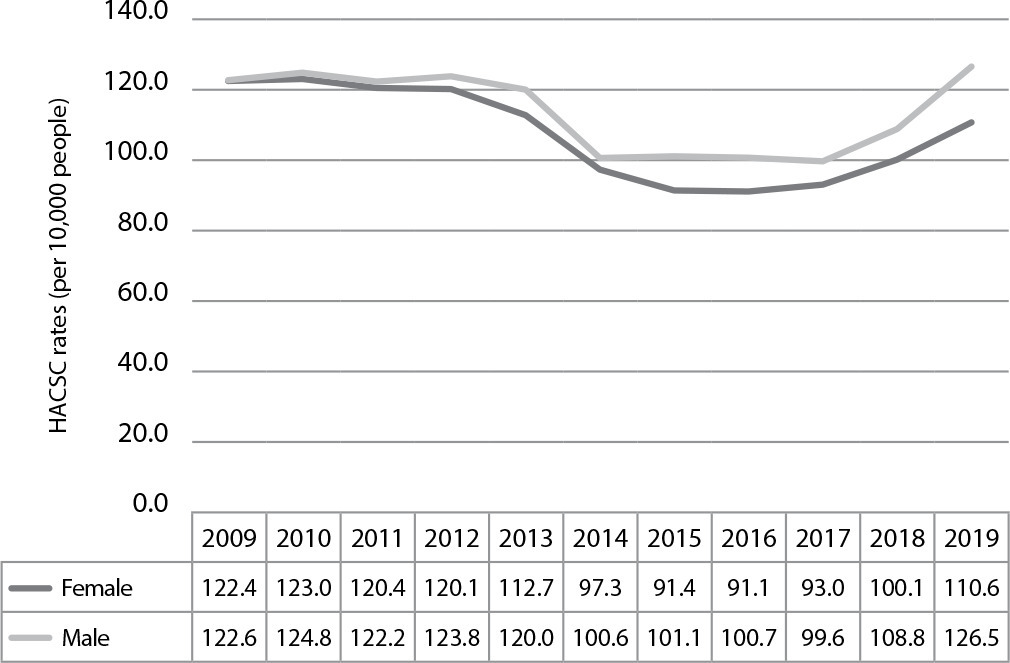
-
ORIGINAL ARTICLE05-08-2023
Precarious work at a surgical center: implications for the organization and for the health of nursing workers
Revista Brasileira de Enfermagem. 2023;76(2):e20220120
Abstract
ORIGINAL ARTICLEPrecarious work at a surgical center: implications for the organization and for the health of nursing workers
Revista Brasileira de Enfermagem. 2023;76(2):e20220120
DOI 10.1590/0034-7167-2022-0120
Views0ABSTRACT
Objectives:
to analyze the implications of precarious work for the organization of work and for the health of nursing professionals in a surgical center.
Methods:
qualitative, descriptive study in which the interview technique was applied on 30 nursing professionals from a surgical center in a university hospital located in the Southeast region of Brazil. The project was approved by the research ethics committee. Thematic content analysis was applied in the categorization of speeches.
Results:
precarious work in the surgical center negatively affects the organization of work due to staff turnover, loss of skilled talent, and the need for continuous training of temporary workers. It also affects the quality of care, leading to risks to patient safety and workers’ health.Final Considerations: it is important to make work conditions less precarious in order to minimize staff turnover and promote the quality of the service offered and the health of the worker.
Keywords:HospitalHuman Resources ManagementNursingOccupational RiskSurgery DepartmentWorkers' HealthSee more
-
REVIEW06-11-2021
Mental health interventions implemented in the COVID-19 pandemic: what is the evidence?
Revista Brasileira de Enfermagem. 2021;74:e20200635
Abstract
REVIEWMental health interventions implemented in the COVID-19 pandemic: what is the evidence?
Revista Brasileira de Enfermagem. 2021;74:e20200635
DOI 10.1590/0034-7167-2020-0635
Views0See moreABSTRACT
Objective:
to map the evidence on mental health interventions implemented during the COVID-19 pandemic.
Method:
this scoping review was carried out in the MEDLINE/PubMed, SCOPUS, Web of Science, PsycINFO, and Science Direct databases and in the medRxiv, bioRxiv, and PsyArXiv preprints servers using the descriptors “Covid-19”, “coronavirus infection”, “coronavirus”, “2019-nCoV”, “2019 novel coronavirus disease”, “SARS-CoV-2”, “health personnel”, “general public”, and “mental health”.
Results:
eight articles were selected and categorized into mental health interventions for the population, among which mental health interventions were for people diagnosed with suspicion/confirmed COVID-19 and mental health interventions for health professionals.
Conclusion:
telemonitoring, virtual games and strategies focused on social support and muscle relaxation techniques, characterized as non-pharmacological and low-cost, were shown as interventions, which, since they are effective, need to be encouraged and included in mental health care practices.

-
Nursing performance in robotic surgeries: integrative review
Revista Brasileira de Enfermagem. 2019;72(3):795-800
Abstract
Nursing performance in robotic surgeries: integrative review
Revista Brasileira de Enfermagem. 2019;72(3):795-800
DOI 10.1590/0034-7167-2018-0426
Views0ABSTRACT
Objective:
To know the scientific production on the performance of the nursing staff in robotic surgeries, identifying the role of the nurse in the three perioperative periods.
Methods:
Integrative review, search in the databases National Library of Medicine, National Institutes of Health, Scientific Electronic Library Online and Biblioteca Virtual em Saúde, performed from June to September, 2017; 17 selected articles met the inclusion criteria.
Results:
Most articles were published in foreign journals in English, nine in the United States, classified with evidence level of 4 and 5. The role of nursing in the perioperative period was identified, related mainly to patient safety. The most mentioned perioperative period in the articles was the intraoperative, with greater concern in the positioning of the patient.
Conclusion:
The nursing performance and patient safety in robotic surgeries are similar to the ones in major surgeries, requiring from the patient a specific knowledge on the setting and preparation of the robot.
Keywords:Nurse's RolePerioperative NursingRoboticsSurgical Procedures, OperativeTechnological DevelopmentSee more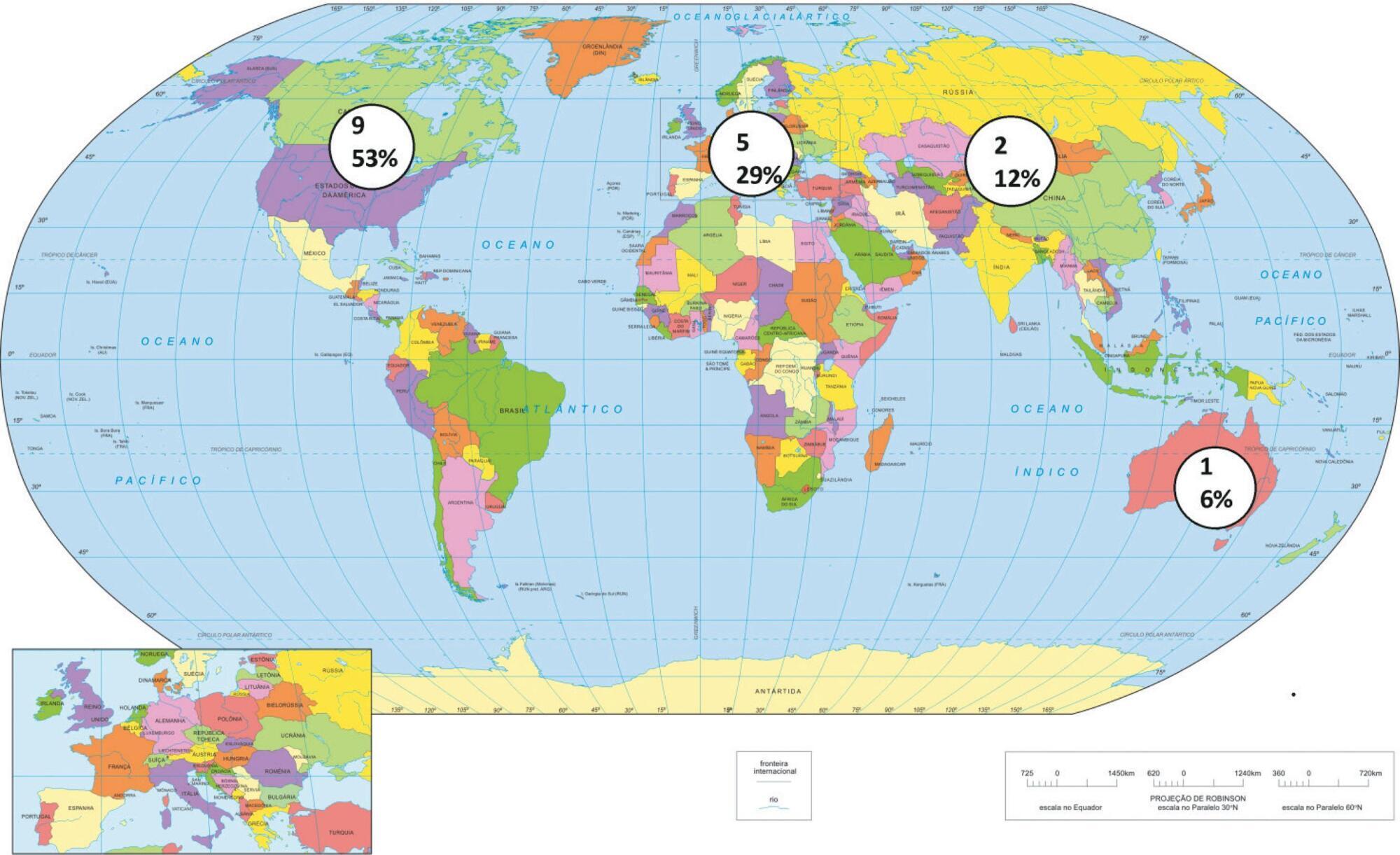
-
ORIGINAL ARTICLE10-21-2019
“Waiting for a miracle”: Spirituality/Religiosity in coping with sickle cell disease
Revista Brasileira de Enfermagem. 2019;72(6):1554-1561
Abstract
ORIGINAL ARTICLE“Waiting for a miracle”: Spirituality/Religiosity in coping with sickle cell disease
Revista Brasileira de Enfermagem. 2019;72(6):1554-1561
DOI 10.1590/0034-7167-2018-0635
Views0See moreABSTRACT
Objective:
To understand spirituality/religiosity as experienced by people with sickle cell disease, and its influence on coping with the disease.
Method:
A qualitative, descriptive, and exploratory study conducted in the State of Bahia. Twenty-nine respondents participated in semi-structured interviews. Content analysis was used to analyze the empirical material.
Results:
Individuals with sickle cell disease experience spirituality/religiosity motivated by their hope for a miracle, and fear of death; among their rites are: reading religious materials, individual and group prayer, and attendance at worship services. The effects on their health include: comfort by means of coping by comparing two evils, anxiety relief, social support, and lifestyle changes; however, spirituality/religiosity may be impaired.
Final considerations:
This study demonstrates the need to qualify health professionals to address spiritual issues of these individuals during illness, with the aims of diagnosing suffering and anguish, and providing care, comfort and strengthening of the spiritual bonds of these individuals.
-
ORIGINAL ARTICLE12-21-2020
Construction and validation of a mobile application for development of nursing history and diagnosis
Revista Brasileira de Enfermagem. 2020;73:e20190674
Abstract
ORIGINAL ARTICLEConstruction and validation of a mobile application for development of nursing history and diagnosis
Revista Brasileira de Enfermagem. 2020;73:e20190674
DOI 10.1590/0034-7167-2019-0674
Views0ABSTRACT
Objectives:
to describe the construction and validation process for a mobile application for development of the nursing history and diagnosis.
Methods:
methodological study conducted in 2018 in three stages: content creation, based on the Basic Human Needs categories and nursing diagnoses; content assessment by nine nursing judges, with calculation of the content validity index; and construction of the application, which included definition of the requirements, a conceptual map, implementation and prototyping options, tests and implementation.
Results:
the application was organized by sections: Grouped Basic Human Needs, Cranial pair tests, Clinical assessment scales and Additional tests. Two section were adjusted according to the judges’ suggestions.
Final Considerations:
it is the first application produced in Brazil based on the Basic Human Need categories, which enables quick access to information, concepts and typical nomenclatures of semiology, recording of clinical data and definition of nursing diagnoses.
Keywords:Educational TechnologyMobile ApplicationsNursing InformaticsNursing ProcessPhysical ExaminationSmartphoneSee more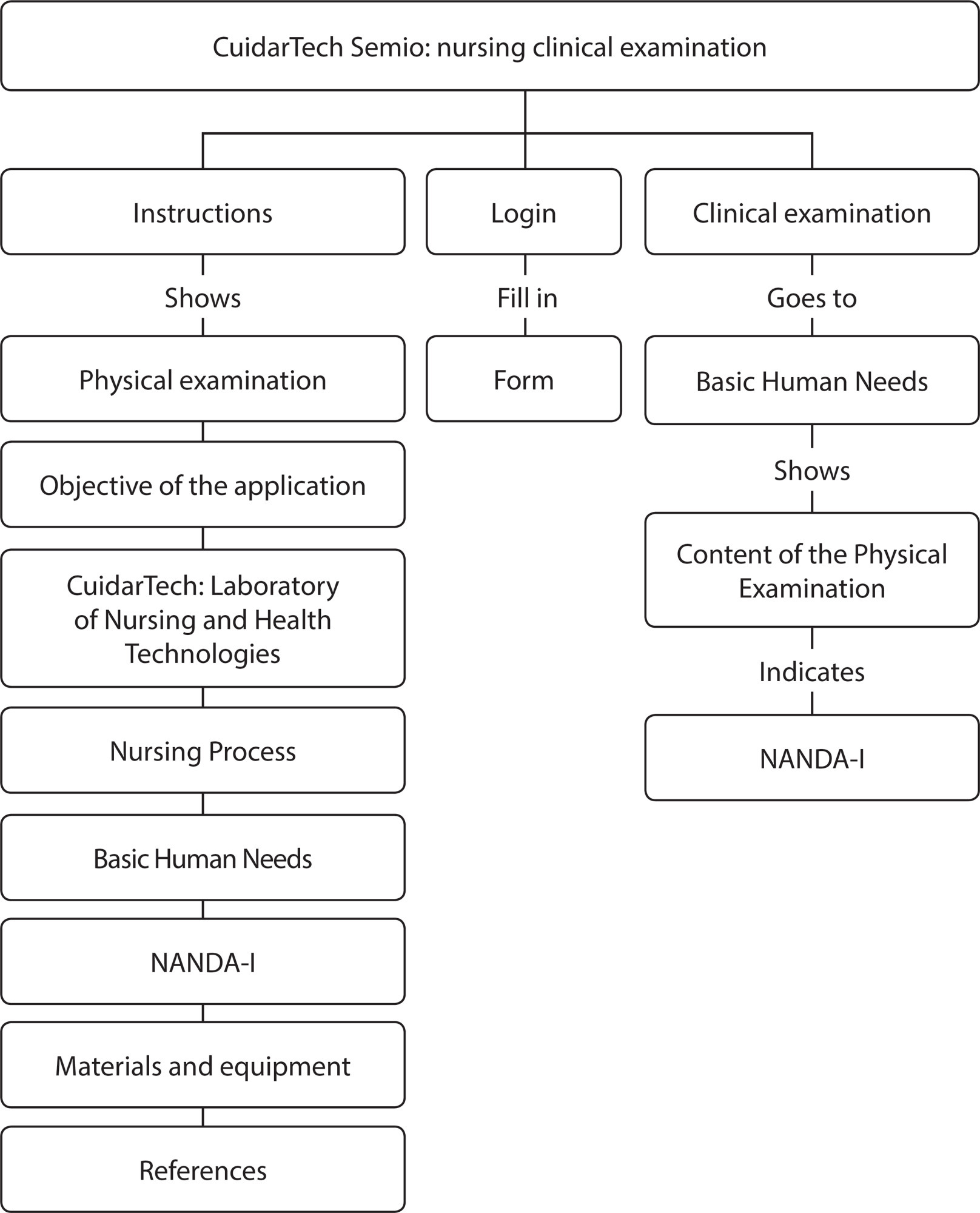
-
ORIGINAL ARTICLE10-01-2022
Factors associated with vulnerability and fragility in the elderly: a cross-sectional study
Revista Brasileira de Enfermagem. 2022;75(2):e20200399
Abstract
ORIGINAL ARTICLEFactors associated with vulnerability and fragility in the elderly: a cross-sectional study
Revista Brasileira de Enfermagem. 2022;75(2):e20200399
DOI 10.1590/0034-7167-2020-0399
Views0See moreABSTRACT
Objectives:
to assess factors associated with vulnerability and fragility in the elderly.
Methods:
crosssectional study with 384 elderly people in Fortaleza, Ceará. The Vulnerable Elders Survey and Clinical-Functional Vulnerability Index – 20 were used. Chi-square and Fisher’s exact tests were used for associations. In the analysis of the combined influence of risk factors, the stepwise logistic regression and multinomial regression methods were adopted.
Results:
251 (65.4%) non-vulnerable and 133 (34.6%) vulnerable elders. From the vulnerable elders analyzed, 42 (30.9%) are at high risk for frailty. Factors associated with vulnerability: age, gender, presence of comorbidities, hypertension, diabetes, osteoporosis and use of polypharmacy. There is a 30% increase in the chance of vulnerability for each additional drug. Physical activity reduces the chance of vulnerability by 60%. Factors associated with frailty: educational level; self-perception of health; comorbidities; polypharmacy.
Conclusions:
it is important to pay attention to the presence of arterial hypertension, osteoporosis, polypharmacy, and encourage the practice of physical activity.
-
ORIGINAL ARTICLE10-21-2019
Caring ability, burden, stress and coping of family caregivers of people in cancer treatment
Revista Brasileira de Enfermagem. 2019;72(6):1541-1546
Abstract
ORIGINAL ARTICLECaring ability, burden, stress and coping of family caregivers of people in cancer treatment
Revista Brasileira de Enfermagem. 2019;72(6):1541-1546
DOI 10.1590/0034-7167-2018-0605
Views0See moreABSTRACT
Objective:
To analyze the association between the caring ability and the burden, stress and coping of family caregivers of people in cancer treatment.
Method:
A cross-sectional study with 132 family caregivers. The following instruments were applied: a characterization instrument, the Caring Ability Inventory, the Zarit Burden Interview, the Perceived Stress Scale, and the Brief COPE. The Spearman Correlation was used with significance ≤5%.
Results:
There were significant and positive correlations between total caring ability and: burden – interpersonal relationship (p=0.03); stress (p=0.02) and maladaptive coping (p=0.00); and inversely proportional correlations with problem-focused coping (p=0.03). The courage had inversely proportional correlation with: self-efficacy (p=0.03), interpersonal relationship (p=0.00), stress (p=0.04) and maladaptive coping (p=0.00). The knowledge had significant and positive correlation with problem-focused coping (p=0.00), adaptive coping (p=0.01), and inverse correlation with stress (p=0.02).
Conclusion:
The level of caring ability correlates with levels of stress and burden, and with the type of coping strategy used by family caregivers.
-
ORIGINAL ARTICLE10-18-2022
Clinical simulation as a Nursing Fundamentals teaching method: a quasi-experimental study
Revista Brasileira de Enfermagem. 2022;75(2):e20201155
Abstract
ORIGINAL ARTICLEClinical simulation as a Nursing Fundamentals teaching method: a quasi-experimental study
Revista Brasileira de Enfermagem. 2022;75(2):e20201155
DOI 10.1590/0034-7167-2020-1155
Views0See moreABSTRACT
Objectives:
to evaluate students’ knowledge gain after the implementation of clinical simulation in Nursing Fundamentals disciplines.
Methods:
a quasi-experimental intervention was carried out with 60 students, distributed in comparison and intervention groups, who underwent traditional teaching and traditional teaching associated with simulated teaching, respectively. Pre-test and post-test instruments were applied to both groups.
Results:
after analyzing the students’ performance through the applied instruments, both groups had a cognitive evolution along with the taught content, however, when compared, the intervention group obtained a higher knowledge gain than the comparison group (p = 0.016), demonstrating progressive and increasing improvement with the use of the methodology.
Conclusions:
simulated teaching significantly helps students in gaining technical-cognitive knowledge. Therefore, it is recommended to adhere to the use of this methodology for teaching Nursing Fundamentals.
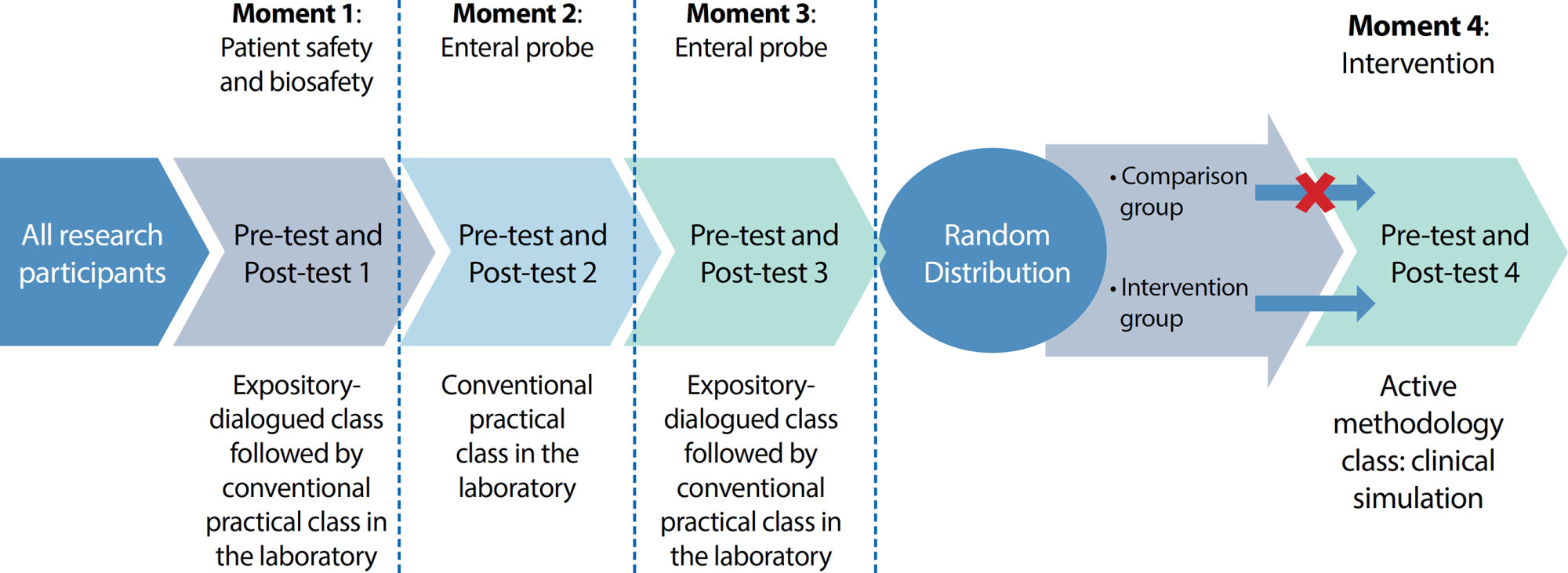
-
ORIGINAL ARTICLE08-10-2020
Eliot Freidson’s sociology of professions: an interpretation for Health and Nursing
Revista Brasileira de Enfermagem. 2020;73(6):e20180950
Abstract
ORIGINAL ARTICLEEliot Freidson’s sociology of professions: an interpretation for Health and Nursing
Revista Brasileira de Enfermagem. 2020;73(6):e20180950
DOI 10.1590/0034-7167-2018-0950
Views0See moreABSTRACT
Objectives:
to analyze theoretical conceptions of Eliot Freidson’s Sociology of Professions scoped on health and nursing professions.
Methods:
Eight nurses were interviewed, all involved in the development of the professional Council on the timeframe from 1975 to 1986. Documental resources were Laws, Ordinances, Resolutions, Reports, Meeting Minutes and Public Deeds. Information was organized as from literature and Eliot Freidson’s conceptions, and thematic content analysis was carried out.
Results:
the concepts authored by Eliot Freidson allowed for the development of a concept chart that portrays the nursing profession and that may be expanded for the other occupations in the health field, in consonance with professional organization in the country.
Final Considerations:
Eliot Freidson’s framework, in interpretation for nursing, consolidates the profession with relative autonomy, expertise by Nursing Care Systematization and credentialism by professional normalizations.
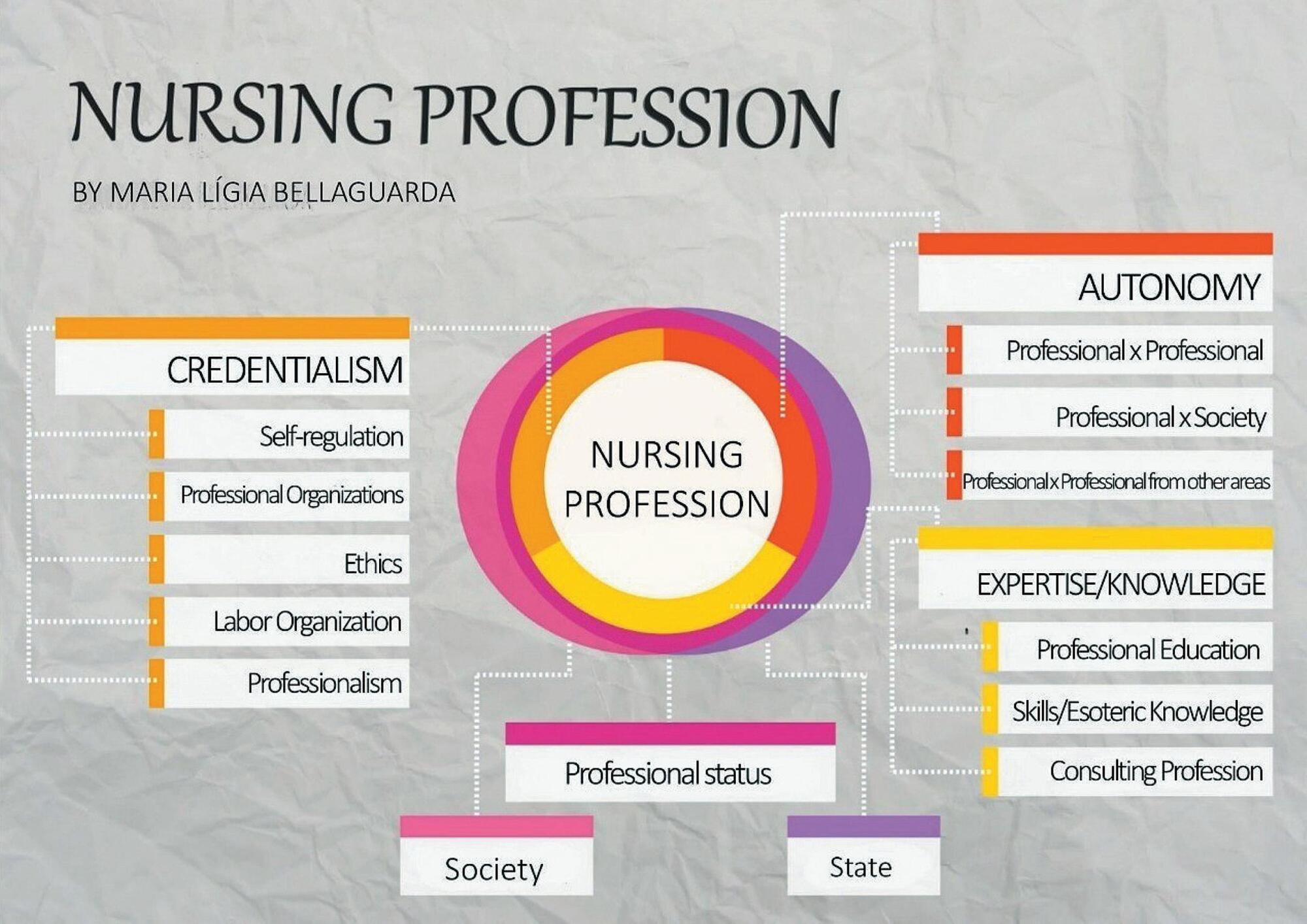
Search
Search in:
Nuvem de Tags
Aged (144) Atenção Primária à Saúde (239) COVID-19 (104) Cuidados de Enfermagem (269) Educação em Enfermagem (151) Educação em Saúde (139) Enfermagem (930) Estudos de Validação (131) Health Education (144) Idoso (208) Mental Health (149) Nursing (987) Nursing Care (306) Patient Safety (151) Primary Health Care (284) Qualidade de Vida (104) Quality of Life (106) Saúde Mental (145) Segurança do Paciente (150) Validation Studies (108)



